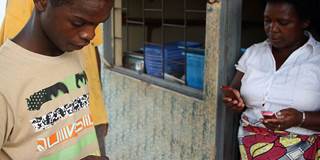The digital age offers enormous opportunities to innovate and improve the way health care is delivered in poor countries. The key to success is to concentrate on end-users and conditions on the ground, rather than being dazzled by the latest technology.
BASEL – Africa has changed remarkably, and for the better, since I first worked as a young doctor in Angola some 20 years ago. But no change has been more obvious than the way the continent has adopted mobile technology. People in Africa – and, indeed, throughout low- and middle-income countries – are seizing the opportunities that technology provides, using mobile phones for everything from making payments to issuing birth certificates, to gaining access to health care.

BASEL – Africa has changed remarkably, and for the better, since I first worked as a young doctor in Angola some 20 years ago. But no change has been more obvious than the way the continent has adopted mobile technology. People in Africa – and, indeed, throughout low- and middle-income countries – are seizing the opportunities that technology provides, using mobile phones for everything from making payments to issuing birth certificates, to gaining access to health care.